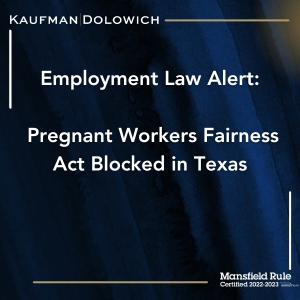Pregnant Workers Fairness Act Blocked in Texas, by Angella H. Myers, Esq., 4-3-2024
 The State of Texas is exempt, for now, from complying with the Pregnant Workers Fairness Act (PWFA) after a federal judge recently ruled the legislation unenforceable.
The State of Texas is exempt, for now, from complying with the Pregnant Workers Fairness Act (PWFA) after a federal judge recently ruled the legislation unenforceable.
This ultimately means Texas’ state employees will not benefit from the protections of the PWFA, which require covered employers to provide reasonable accommodations to a worker’s known limitations related to pregnancy, childbirth, or related medical conditions, unless the accommodation will cause the employer an undue hardship.
While private employers should continue to comply with the PWFA, the recent court ruling could add a level of complexity and signal future discourse and challenges over the PWFA.
Background
On February 27, 2024 United States District Judge James Wesley Hendrix of the United States District Court for the Northern District of Texas, filed an order blocking the federal government’s enforcement of the PWFA on the grounds it violated the U.S. Constitution’s Quorum Clause. The Quorum Clause requires a majority of members of the House or Senate to be physically present to constitute the necessary quorum to pass legislation.
The PWFA was passed in late 2022 as part of the Consolidated Appropriations Act of 2023. The order notes that when the House of Representatives passed the Act, less than a majority of the House voted in person. The House in 2020 created a rule during the pandemic that permitted non-present members to be included in the quorum count and vote by proxy, but Judge Hendrix opined “by including members who were indisputably absent in the quorum count, the Act at issue passed in violation of the Constitution’s Quorum Clause.”
Judge Hendrix’s ruling comes in response to a lawsuit filed by Texas Attorney General Ken Paxton last year suing the Biden Administration over what he argued was the “unlawful signing and implementation” of the Consolidated Appropriations Act of 2023 due to it being passed without a quorum. In the lawsuit, AG Paxton was looking to block two provisions in the spending package including the PWFA, which he purported would subject the state “to the costs, hassles, and attendant risks of administrative proceedings, investigations and lawsuits by both private individuals and the federal government…”
Judge Hendrix agreed with the Attorney General’s argument. As a result, Judge Hendrix enjoined federal agencies including the Equal Employment Opportunity Commission (EEOC) from enforcing the PWFA against Texas and its agencies. The EEOC, as the federal agency designated by Congress with implementing and enforcing the PWFA, has published proposed regulations to implement the PWFA. But it has not yet published final regulations in the Federal Register.
Potential Legal Fallout
In the meantime, the recent ruling could have farther implications than just Texas. The HR Policy Association contends that while the Judge’s Order is limited to Texas state public employees, it could potentially inspire similar lawsuits in other states that could block the law for the private sector.
Despite the uncertainty this ruling brings, it is clear that pregnancy-related discrimination continues to be a hot employment topic and should remain on employers’ radars. As such, companies should ensure they are complying proactively with state, local and federal laws.
Kaufman Dolowich Can Help
If you need assistance complying with the PWFA or any other applicable laws or accommodation requests, Kaufman Dolowich’s team of skilled labor and employment attorneys can help.










